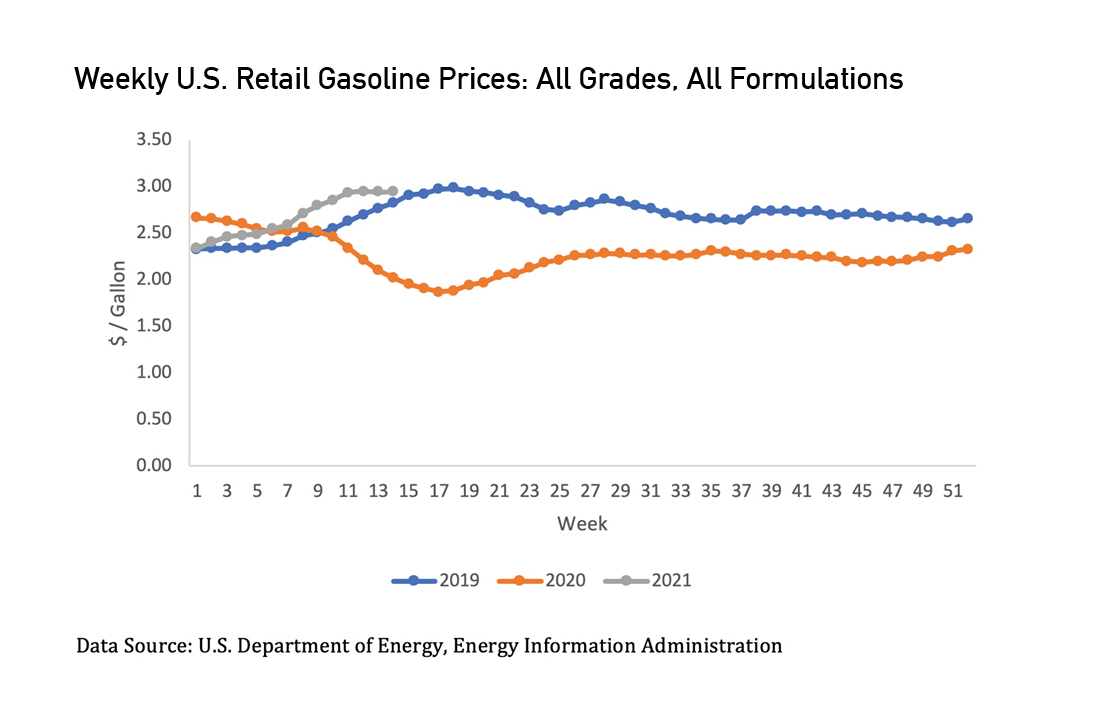Fuel prices, scarcity rising thanks to weather-disrupted production
Drivers are noticing higher prices at the pump thanks to weather-related production disruptions.
Media contact: Mary Hightower mhightower@uada.edu 501-671-2006
April 9, 2021
By Mary Hightower
U of A System Division of Agriculture
Fast facts
- S. gas prices up 25 percent since first week of 2021
- Prices rise 35 since first week of 2021 in region that includes Arkansas
(410 words)
(Newsrooms – with file photos at https://flic.kr/p/2kRZEfa )
FAYETTEVILLE, Ark. — Drivers are noticing higher prices at the pump thanks to weather-related production disruptions, according to an analysis published Friday by the University of Arkansas System Division of Agriculture.
“Summer driving season is fast approaching, and after a year of severely curtailed travel due to the pandemic, people are itching to get on the road,” said John Anderson, economist with the University of Arkansas System Division of Agriculture and the Dale Bumpers College of Agricultural, Food and Life Sciences. Over the last year, Anderson has been providing analysis of how COVID-19 has affected many facets of our economy, including meat prices, consumer spending and employment.

Anderson said that for the week ending April 5, the average retail price of gasoline in the United States was $2.945 per gallon.
“This is about even with prices in late-spring and early-summer 2019, but it is far higher than the pandemic-induced low of $1.87 per gallon in late-April 2020,” he said.
While the Energy Information Administration doesn’t break out Arkansas prices, the state is included in their Petroleum Administration for Defense District 3, known as PADD3. The district includes Alabama, Arkansas, Louisiana, Mississippi, New Mexico, and Texas.
“The PADD3 average retail gasoline price hit $2.693 per gallon near the end of March before retreating almost a nickel in the subsequent two weeks,” Anderson said. “This is a lower average than the U.S. price, but the increase since the first of the year has been greater: U.S. prices have gone up about 25 percent since the first week of the year; PADD3 prices have gone up about 35 percent over that same period.
“Prices in the PADD3 region are the highest since June 2018,” he said.Some of this is due to production disruption from extreme cold in late February, as well as refiners slowing to change gears to production of summer formulations. Anderson also said “Anecdotally, some localized shortages have even developed.”
Looking ahead
Looking down the road, the increases aren’t expected to continue as steeply.
“Despite expectations for strong seasonal demand, bolstered by a steady return to more normal post-pandemic activity, retail gasoline prices are likely to begin to moderate as the supply side of the market recovers from the recent shocks,” he said. “Total gasoline stocks, which include not only finished gasoline but also major gasoline blending components, have already turned up – recovering a bit faster than the market anticipated.”
Follow us on Twitter at @AgInArk, @uaex_edu or @ArkAgResearch. Find 4-H information at this link: https://4h.uaex.edu/.
About the Division of Agriculture
The University of Arkansas System Division of Agriculture’s mission is to strengthen
agriculture, communities, and families by connecting trusted research to the adoption
of best practices. Through the Agricultural Experiment Station and the Cooperative
Extension Service, the Division of Agriculture conducts research and extension work
within the nation’s historic land grant education system.
The Division of Agriculture is one of 20 entities within the University of Arkansas
System. It has offices in all 75 counties in Arkansas and faculty on five system campuses.
Pursuant to 7 CFR § 15.3, the University of Arkansas System Division of Agriculture offers all its Extension and Research programs and services (including employment) without regard to race, color, sex, national origin, religion, age, disability, marital or veteran status, genetic information, sexual preference, pregnancy or any other legally protected status, and is an equal opportunity institution.
# # #